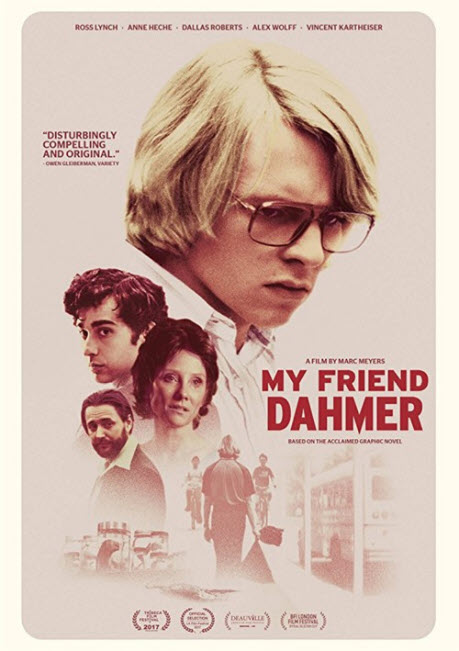(2017, 107 min)
Country: U.S.
Director: Marc Meyers
Studio: FilmRise
Language: English
SYNOPSIS: Jeffrey Dahmer murdered 17 men and boys in the American Midwest, becoming one of history's most infamous serial killers. This is the story before that story. Jeff (Ross Lynch) is an awkward teenager struggling to make it through high school with a family life in ruins. His bizarre behavior at school attracts unexpected friends, a group of band-nerds who form "The Dahmer Fan Club," headed by Derf Backderf (Alex Wolff). But as they near graduation, Jeff's depravity continues to take hold, and he spirals further out of control.
Written for the screen and directed by Marc Meyers, this film is based on the acclaimed 2012 graphic novel of the same name by real-life Dahmer classmate and former friend Derf Backderf (played by Alex Wolff in the film.
REVIEW:
Director Marc Meyers's "My Friend Dahmer' is based on the graphic novel by Dahmer's childhood friend John Backderf and is a narrative biopic that goes deeply into Dahmer's life during his senior year in high school. Dahmer (Ross Lynch) had a habit of pretending to have cerebral palsy in order to get attention and this inspires a group of boys (Alex Derf, Harrison Holzer, and Tommy Nelson) to create a fan club in his honor, and use him for elaborate pranks (he is so invisible that they put him in every club's class picture without anyone noticing). Dahmer's habit of doing dark, odd things is viewed as excitingly taboo at first, and this objectification both pained and thrilled him.
At home, Jeffrey's mother (Anne Heche) suffers from mental illness. His father (Dallas Roberts) leaves, both of them and Dahmer is abandoned by both parents. When he discovers that he is homosexual, he tries desperately to suppress it. The local doctor, Dr. Matthews (Vincent Kartheiser), becomes his first object of real obsession. Dahmer is mortified by getting an erection during a physical, imagines the doctor dead in his bed, and hides in the bushes with a baseball bat during the doctor's jogs on a rural road. When "his friends" see him act out increasingly terrifying, violent acts, they begin to regret teasing him. As the days wear on, Dahmer's sense of alienation grows and the only relief he has is by acting out early horrific crimes.
Because we know who he grows up to be, there is an element of terror that's often nearly impossible to capture, so Meyers focuses on Dahmer's psyche over trying to ham up his violent acts. The scares come more from the growing tension of understanding who he is going to become when he graduates as it gets closer to the end, and this is intensified by several scenes of his male classmates rough housing and bragging over their bright futures as Dahmer sits in the corner all alone.
Dealing with a character like Dahmer is very difficult and we have no sympathy for him even though our eyes fill with tears during a scene is which he cuts himself off from the opportunity to turn back from his fate. It is like watching a teen transform into a monster; our tears are not for Dahmer but for what he becomes because of this.
The film toys with audiences who already know what happens after Dahmer barely survives his teen years. The film pieces together a taut psychological thriller that leaves no one innocent, including the audience. I cannot help but wonder why I and others would want to see this film yet is getting rave reviews from those who do see it. Is it because Dahmer is subjected to the cruelty of classmates and experiments with the acid his father, a scientist, gave him to dissolve dead animals. We meet three students from Dahmer's high school who take an interest in him, and we see that the feeling is mutual, even if both sides are aware that the relationship they have is not really a friendship. The three see Dahmer as a bit of a class clown who can ease the final days of their senior year after seeing him act out in the halls one day after he stopped caring what people think. At school, even the teachers mock him when he's caught off-guard with a question and Dahmer stops caring about people altogether.
We see the evil that arises every day for some and we do not know if this comes as a result of self-preservation or the desire to get ahead. What Meyers does here indirectly is show that Dahmer's tormentors condition him to treat others in dehumanizing fashions, without them seeing the consequences. They will be away at college and what they do to Dahmer will stay with him (but that did not matter to them).
We watch Dahmer begin to adapt to the situations he's in after spending so much of the film as a loner. What he does becomes a subversive act and there is the tendency too cheer for the introvert to come out of his shell. This is where this transcends its historical attachments to add a new dimension to the story by exploring the myth making that often surrounds our villains and our heroes bolstering their rise to fame. "My Friend Dahmer" adds a whole other layer of intrigue as you see his personality constructed by influences he allows in and the ones he can't control from the public at large.Ross Lynch is amazing as Dahmer. At times he is awkwardly charming; at other times he is totally chilling.
"My Friend Dahmer" is a captivating and thoughtful meditation on the making of a killer. It's a serious and audacious attempt to dramatize the inner life of a sick person when he wasn't quite so sick. We get the idea that Jeffrey Dahmer wasn't just born, he was made. He began life as an actual human being yet this never undercuts the extremity of his crimes.
Dahmer's crush on his doctor who he sees jogging each morning from the school bus is a feeling that he doesn't know what to do with. His home seems to be quite normal on the outside but his mother has been in and out of mental institutions. In her we see the insidiousness of mental illness and the way it creates an atmosphere of instability that affects the people around it. Both his father and himself are unable to deal with it and so Dahmer retreats into the chemistry shed in the rustic backyard of their home and fixates on the insides of animals as if he is trying to find his own soul. He becomes obsessed with this, and when his dad dismantles the shed, Dahmer reacts by faking an attack at school. This is a clear sign that he's had it with interacting but the three guys think it is cool. While society itself does not create serial killers, it is safe to say that society creates the context for them. With the encouragement of his "new buddies" (who see him as a freak), he begins to have attacks at school.
The movie implicitly tells us that if Dahmer had felt like it, he could have expressed his sexual feelings and then be on another path. Instead, he holds everything within and cannot tolerate the desire that he perceives that those around him can't tolerate. He could not see his own insanity. In the film we see Jeffrey Dahmer for what he was: a young man who could express himself only through the most hideous violence. We also see that what he had to express was real.
-- Review by Amos Lassen (reviewsbyamoslassen.com/)




